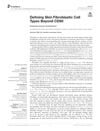 38 citations,
January 2011 in “Endocrine Journal”
38 citations,
January 2011 in “Endocrine Journal” Weight loss and metformin don't significantly change vaspin levels in women with PCOS.
 38 citations,
January 2006 in “Journal of Cellular Biochemistry”
38 citations,
January 2006 in “Journal of Cellular Biochemistry” Researchers isolated a new type of stem cell from mouse skin that can renew itself and turn into multiple cell types.
 37 citations,
January 2009 in “The Journal of Dermatology”
37 citations,
January 2009 in “The Journal of Dermatology” Hair follicle stem cells can turn into various cell types and help repair nerves.
 36 citations,
January 2014 in “Elsevier eBooks”
36 citations,
January 2014 in “Elsevier eBooks” The skin is a complex barrier that protects the body, regulates temperature, and helps with immune responses.
 36 citations,
September 2009 in “Journal of Cellular and Molecular Medicine”
36 citations,
September 2009 in “Journal of Cellular and Molecular Medicine” New treatments targeting skin stem cells show promise for skin repair, anti-aging, and cancer therapy.
 35 citations,
March 2014 in “British Journal of Dermatology”
35 citations,
March 2014 in “British Journal of Dermatology” Hair loss in male pattern baldness involves muscle degeneration and increased scalp fat.
 34 citations,
December 2012 in “Current Opinion in Clinical Nutrition and Metabolic Care”
34 citations,
December 2012 in “Current Opinion in Clinical Nutrition and Metabolic Care” Sex hormone treatments can increase muscle mass in older adults but have inconsistent effects on muscle function and may carry cardiovascular risks.
 33 citations,
October 2010 in “Journal of Dermatological Science”
33 citations,
October 2010 in “Journal of Dermatological Science” Hair follicle stem cells are a practical and ethical option for nerve repair in regenerative medicine.
 31 citations,
October 2018 in “Frontiers in Cell and Developmental Biology”
31 citations,
October 2018 in “Frontiers in Cell and Developmental Biology” The conclusion is that CD90 is not a specific marker for fibroblast subtypes and better methods are needed to identify them.
 31 citations,
July 2017 in “Clinical Science”
31 citations,
July 2017 in “Clinical Science” MicroRNAs are important for skin health and could be targets for new skin disorder treatments.
 30 citations,
April 2017 in “Experimental Dermatology”
30 citations,
April 2017 in “Experimental Dermatology” Hair follicle stem cells and skin cells show promise for hair and skin therapies but need more research for clinical use.
 29 citations,
January 2018 in “International Journal of Trichology”
29 citations,
January 2018 in “International Journal of Trichology” PRP treatment helps hair growth and density with 70.7% success, but more research needed.
 28 citations,
August 2000 in “Current Opinion in Chemical Biology”
28 citations,
August 2000 in “Current Opinion in Chemical Biology” Future osteoporosis treatments should focus on increasing bone growth, with many promising options available.
 27 citations,
July 2018 in “Experimental dermatology”
27 citations,
July 2018 in “Experimental dermatology” Autophagy is crucial for normal sebaceous gland function and sebum composition.
 26 citations,
February 2020 in “Frontiers in genetics”
26 citations,
February 2020 in “Frontiers in genetics” The CORT, FGF5, and CD36 genes are crucial for the cold weather adaptation of Yanbian cattle.
 26 citations,
August 2019 in “Stem Cell Research & Therapy”
26 citations,
August 2019 in “Stem Cell Research & Therapy” PBX1 helps hair stem cells grow and change by turning on certain cell signals and preventing cell death, which may be useful for hair regrowth treatments.
 25 citations,
May 2020 in “Aesthetic Surgery Journal”
25 citations,
May 2020 in “Aesthetic Surgery Journal” The regenerative solution, tSVF, is a safe and effective treatment for various conditions like aged skin, scars, wounds, and more, but more research is needed to find the best way to use it.
 25 citations,
July 2019 in “Experimental Dermatology”
25 citations,
July 2019 in “Experimental Dermatology” Cholesterol balance is important for hair health, and problems with it can lead to hair loss conditions.
 25 citations,
March 2017 in “Experimental Dermatology”
25 citations,
March 2017 in “Experimental Dermatology” The document concludes that understanding hair follicles requires more research using computational methods and an integrative approach, considering the current limitations in hair treatment products.
 25 citations,
July 2016 in “The journal of investigative dermatology/Journal of investigative dermatology”
25 citations,
July 2016 in “The journal of investigative dermatology/Journal of investigative dermatology” Imiquimod cream activates hair follicle stem cells and causes early hair growth by changing immune cells and certain protein expressions.
 25 citations,
May 2016 in “Progress in Biophysics & Molecular Biology”
25 citations,
May 2016 in “Progress in Biophysics & Molecular Biology” R-spondins and their receptors help increase bone growth and may be used to treat bone loss diseases.
 24 citations,
December 2018 in “Life sciences”
24 citations,
December 2018 in “Life sciences” Lysophosphatidic acid is important for skin health and disease, and could be a target for new skin disorder treatments.
 24 citations,
March 2018 in “Pigment Cell & Melanoma Research”
24 citations,
March 2018 in “Pigment Cell & Melanoma Research” The environment around melanocyte stem cells is key for hair regeneration and color, with certain injuries affecting hair color and potential treatments for pigmentation disorders.
 21 citations,
March 2019 in “Critical Reviews in Clinical Laboratory Sciences”
21 citations,
March 2019 in “Critical Reviews in Clinical Laboratory Sciences” The androgen receptor is a promising target for breast cancer treatment, especially in triple-negative cases, but more research is needed for personalized therapies.
 21 citations,
October 2017 in “Journal of Investigative Dermatology”
21 citations,
October 2017 in “Journal of Investigative Dermatology” The document concludes that understanding dermal papilla cells is key to improving hair regeneration treatments.
 21 citations,
February 2016 in “Reproductive Biomedicine Online”
21 citations,
February 2016 in “Reproductive Biomedicine Online” The conclusion suggests that PCOS may persist due to genetic traits that, while harmful for female fertility, could have provided survival and reproductive benefits to males.
 21 citations,
December 2007 in “Primary Care”
21 citations,
December 2007 in “Primary Care” Early diagnosis and treatment of PCOS is crucial to reduce emotional distress and health risks.
 20 citations,
March 2017 in “Journal of cutaneous pathology”
20 citations,
March 2017 in “Journal of cutaneous pathology” Shrinking of oil glands in the skin is a key sign of hair loss linked to TNF inhibitor drugs and may improve if the treatment is stopped.
 19 citations,
March 2018 in “Journal of Investigative Dermatology”
19 citations,
March 2018 in “Journal of Investigative Dermatology” The gene Msx2 is crucial for hair follicle regeneration during wound healing.
 19 citations,
April 2015 in “Stem Cells”
19 citations,
April 2015 in “Stem Cells” Pro-IGF-II improves muscle repair in old mice.






























